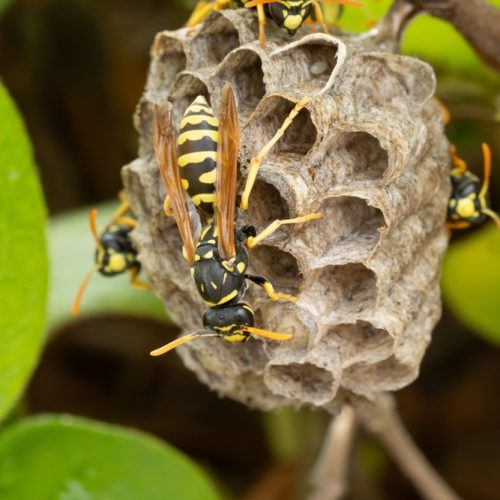Missouri summers bring cookouts, pool days, and, unfortunately, wasps. These buzzing visitors are more than just a nuisance; they can pose risks to your family and pets if they decide to settle too close to home. While wasps play an important role in our ecosystem by controlling other pests and pollinating plants, they can be aggressive when defending their nests.
This comprehensive guide will equip you with the knowledge to prevent wasp infestations, recognize signs of trouble, and deal with these pests safely.
Understanding Missouri Wasps
The Common Culprits to Watch For
Missouri is home to several wasp species, each with unique behaviors and nesting habits. Here are the main types you’re likely to encounter in your backyard or around your property:
- Paper Wasps: These wasps build open, umbrella-shaped nests, usually under eaves or overhangs. They’re not as aggressive as other species but will sting if their nest is threatened.
- Yellow Jackets: Known for their aggressive nature, yellow jackets build enclosed nests in the ground, walls, or shrubs. Their black and bright yellow stripes make them easy to spot.
- Bald-faced Hornets: Despite their name, these are wasps with black bodies and white facial markings. Their large paper nests, often the size of a basketball, are usually found in trees or dense shrubs.
- Mud Daubers: Solitary in nature, these wasps create tube-like mud nests on walls or under sheltered areas. They are not aggressive and rarely sting.
Seasonal Wasp Behavior
Knowing how wasps behave throughout the year can help you take proactive measures.
- Spring: Queens emerge to build new nests. This is the best time to implement preventative measures.
- Summer: Wasps become highly active as colonies grow and defend their nests aggressively.
- Fall: Competition for food escalates, making wasps more unpredictable and confrontational.
- Winter: Most wasps die, leaving only fertilized queens to hibernate until spring.
Tips to Prevent Wasps from Nesting Near Your Home
Landscape Adjustments
Your yard’s design plays a significant role in preventing wasps from settling in. Here’s how to create an unwelcoming environment for them:
- Mind Your Plants: Avoid planting fragrant flowers or placing flowering plants near doorways and high-traffic areas. Opt for wasp-repelling plants like mint or citronella instead.
- Clean Up Fruits: If you have fruit trees, promptly harvest ripe fruit and clear fallen fruit, which can attract wasps.
- Manage Water Sources: Cover pools, birdbaths, and eliminate standing water to reduce wasp activity.
- Regular Maintenance: Keep your grass mowed and trim bushes or hedges to remove ideal nesting spots.
Securing Your Home’s Exterior
Simple home maintenance can protect you from unwelcome nests:
- Seal Cracks and Openings: Inspect your home’s exterior for gaps, damaged screens, or openings around utility entrances. Caulk and seal these to keep wasps out.
- Eaves and Overhangs: Wasps often build under eaves, so applying a silicone-based sealant creates a slick surface they can’t attach their nests to.
- Change Outdoor Lighting: Replace standard lights with yellow “bug lights” or sodium vapor bulbs to attract fewer insects, which in turn attracts fewer wasps.
- Frequent Inspections: Walk around your property every couple of weeks, especially in spring, to spot early-stage nests before they grow.
Smart Outdoor Living Practices
The easiest way to attract these wasps is by leaving out something like sugary lemonade. So, clean food and drinks. Keep food covered and quickly clean up spills. Use cups with lids to keep wasps from landing on your beverages. To manage your trash, use tightly sealed trash cans and rinse recyclables before disposal to avoid attracting wasps.
What to Do If You Spot a Wasp Problem
Recognizing an Infestation
You may have a wasp issue if you notice these signs:
- Wasps were consistently flying in and out of the same area.
- Discovery of a nest, whether under an eave, in a shrub, or underground.
- Increased activity around trash bins or outdoor dining areas.
When to Call the Professionals
Certain situations demand the expertise of a trained pest control team:
- Large nests, bigger than a softball, or those located in hard-to-reach areas.
- Aggressive species like yellow jackets nesting underground.
- Multiple nests are present on your property.
- Anyone in your household with known allergies to wasp stings.
Steve’s Pest Control offers targeted solutions, using professional-grade treatments to eliminate wasp infestations while keeping your family safe.
Handling Wasp Stings
Immediate First Aid
For mild reactions, take these steps if stung:
- Wash the area with soap and water to reduce the risk of infection.
- Apply a cold pack to minimize swelling.
- Take an over-the-counter antihistamine to manage itching or discomfort.
Signs of a Severe Allergic Reaction
Seek immediate medical help if symptoms include:
- Difficulty breathing.
- Facial or throat swelling.
- Dizziness, nausea, or rapid pulse.
If you or someone in your household has been stung and has a known allergy, administer an epinephrine auto-injector and call emergency services immediately.
Keeping Wasps in Check for Good
By implementing prevention techniques in the summer and addressing problems promptly, you can enjoy your outdoor spaces without fear of stings. While living in harmony with these beneficial insects is ideal, when they encroach on your safety, swift action is essential.
For complete peace of mind, Steve’s Pest Control provides expert wasp prevention and control services tailored to homes in Missouri. Whether you’re dealing with a small nuisance nest or a major infestation, our certified technicians are here to help. Contact Steve’s Pest Control today to schedule your inspection and reclaim your outdoor spaces!
There is a noticeable uptick of both wasps and flies activity in the warmer months. Types of flies – Discover the main species we treat on our Fly Pest Control page.



